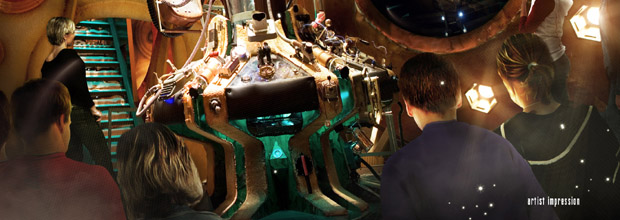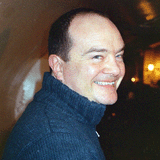
Featuring a unique walk-through experience and an exhibition, the Doctor Who Experience opens in London later this month.
The exhibition element will include original costumes, the Tom Baker TARDIS police box and two authentic TARDIS sets from the eras of David Tennant and Peter Davison. The public will also be able to get up close and personal with the Pandorica Box and Chair and confront numerous monsters including several generations of the Daleks and Cybermen as well as Silurians an Ice Warrior and a Zygon.
The Doctor Who Experience includes special scenes filmed with current Doctor Matt Smith, with the chance to enter a recreation of the modern TARDIS interior topped off by a 3D finale.
Watch the trailer…
CultBox caught up with BAFTA-winning special effects expert Mike Tucker (who has been is in charge of refurbishing the monsters and props for the Doctor Who Experience) to find out more…
 Can you tell us a bit about how you got involved with the Doctor Who Experience and what your role entails?
Can you tell us a bit about how you got involved with the Doctor Who Experience and what your role entails?
“My involvement came via Andrew Beech, the Artefacts Manager at BBC Worldwide. He was aware that I had worked on Doctor Who, both ‘classic’ and ‘new’ series, and that I was probably a good candidate for handling the refurbishment of some of the props and models that had been on display over the years.
“In some cases – such as the Dalek Emperor miniature – I was even able to get the model makers who had built it originally to work on the refurbishment.”
What should visitors expect from the experience?
“It’s a far more immersive experience than previous exhibitions, plus you can get up close to some of the props in a way that hasn’t previously been possible.”
What does the interactive walk-through experience involve and have you tried it yet?
“I’ve not actually been through that bit of the exhibition yet, so I’m looking forward to being as surprised by it as the rest of the audience.”
The original David Tennant era TARDIS set will be on display. Was it a tough job putting this back together after the explosive final scenes of ‘The End Of Time’?
“The David Tennant era TARDIS interior was actually handled by the Sarner crew plus a team from Cardiff. My involvement has been with the 1980s era TARDIS console used by Peter Davison, Colin Baker and Sylvester McCoy, and has involved replacing switches and buttons that have come loose over the years and checking that the electrics are still in good working order.”
Which exhibits are you personally most excited to have on display at the exhibition?
“It’s exciting to see such an iconic monster as the Ice Warrior finally restored to its former glory. For it to have survived since the mid 1960s relatively intact is quite an achievement and my team have done a really good job of restoring him.”
When did you start working at the BBC Television Visual Effects Department and what were your first jobs there?
“I joined the BBC VFX department in 1985 and amongst my very first jobs were a children’s show called Galloping Galaxies, a documentary on John Lennon and Series 1 of Red Dwarf. I also had to build a model of the TARDIS for an episode of Doctor Who.”
Had you always been interested in model-making and special effects as a child?
“Yes, I grew up building Airfix kits or making models out of Lego or Meccano. I also used to use my dad’s old 8mm film camera to make films of my own. I was hugely influenced by the Gerry Anderson puppet series like Thunderbirds and Captain Scarlet, and also by films like Sinbad and Jason And The Argonauts, produced by Ray Harryhausen.”
 Which Doctor Who visual effects that you’ve worked on were the most complicated to arrange and which are you most proud of?
Which Doctor Who visual effects that you’ve worked on were the most complicated to arrange and which are you most proud of?
“I was an assistant on a Colin Baker Doctor Who story called ‘The Trial Of A Time Lord’ that had one of the most complex motion control set ups that I’ve ever been involved with, but I’m probably most proud of the work that we did on ‘Rose’ in 2005, when we destroyed the Nestene creature’s lair at the climax of the story.”
With productions relying increasingly on digital effects, do you think there will still always be a place for practical effects too in TV and film?
“Obviously the advent of digital effects has had a huge impact on my industry, but I still feel that effects are most convincing when every technique is used, regardless of whether its new or ancient. The recent Christopher Nolan film Inception shows to spectacular effect what can be done if you use all the tools available, both digital and practical.”
Have you been working on the upcoming Series 6 of Doctor Who?
“Sadly I’ve had no involvement with Doctor Who for some time now, but if anyone from the production is reading this, then I’m very happy to come back on board!”
The Doctor Who Experience opens at London’s Olympia Two on Sunday 20th February. Tickets are on sale at doctorwhoexperience.com.
Mike Tucker’s book, ‘BBC VFX: The Story Of The BBC Visual Effects Department’, is out now.

